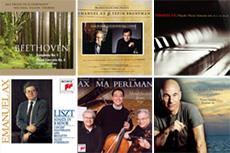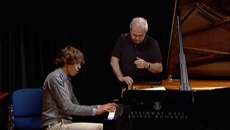Conductor Afkham strikes sparks with CSO, Ax in impressive debut
By admin on November 9, 2016 | Category: News | No CommentsBy Lawrence A. Johnson
Chicago Classical Review
21 October 2016
The 2016-17 season will see five young conductors make their Chicago Symphony Orchestra debuts.
One can also–kind of sort of–add David Afkham to that list for an even six. Though he has led the orchestra twice previously in family and appreciation events, Thursday night’s program of Beethoven and Shostakovich marked Afkham’s CSO subscription bow.
And a very impressive debut it was indeed. Currently music director of the Spanish National Orchestra, the German conductor led Thursday’s concert with a confidence and seasoned maturity beyond his 33 years. Tall and energetic, he elicited full-bodied, vibrant playing from the orchestra and consistently illuminated details in the music without ever sounding pedantic or sacrificing momentum.
The evening led off with Emanuel Ax as soloist in Beethoven’s Piano Concerto No. 1, the first installment of this season’s series of the composer’s complete keyboard concertos. Ax has been performing Beethoven widely in recent seasons, and just this past March played the Fourth Concerto under Michael Tilson Thomas with the CSO. (He has recorded his second complete Beethoven cycle with the same conductor and the San Francisco Symphony.)
The veteran pianist and the young conductor seemed to strike sparks, for Ax’s performance of Beethoven’s First Concerto gave us his finest CSO stand of recent seasons.
From the rich, firmly contoured introduction Afkham queued up for his soloist, Ax was fully in the Beethoven zone. The pianist threw the music off with a light, playful touch apt for this early work, his nimble dynamic marking and joie de vivre fully in synch with the score’s youthful high spirits. For once, Beethoven’s extended cadenza for the first movement didn’t feel overlong and indulgent, as Ax’s sparking rendition made it seem fresh and wholly delightful.
The soloist’s singing, expressive line in the Largo had a poised, unsentimental expression, nicely backed by John Bruce Yeh’s clarinet playing. There was a wonderful give-and-take spontaneity in the rollicking finale that was infectious, the soloist and conductor echoing each other’s steep dynamic drops, batting the main theme back and forth, and closing in an exhilarating coda.
Ax was clearly taken with his young podium colleague, immediately embracing Afkham at the thunderous ovation. Four curtain calls brought the pianist back out for a limpid and poetic solo encore of Schumann’s “Des Abends” from his Op. 42 Fantasiestücke.
The evening moved from youthful optimism to surmounted tragedy with Shostakovich’s Symphony No. 10.
Written in a burst of inspiration following the death of Stalin in 1953, it’s not too hard to sense the composer’s mixed feelings in his Tenth Symphony. Cast on a vast 55-minute canvas, the score proceeds from the epic violent upheaval of the long opening movement to a portrait of the murderous Soviet dictator, and closes in confidence and optimism.
From the taut opening statement of cellos and basses, it was clear that Afkham was in full command of this epic, challenging work. Throughout the conductor drew playing of astounding power as well as uncommon subtlety, while keeping strong narrative flow.
The long opening movement was charted with supreme concentration by Afkham with superb solo contributions from clarinetist Stephen Williamson and bassoonist Keith Buncke painting the lonely, desolate atmosphere. The movement’s grinding climax was shattering in its massive sonic impact with Cynthia Yeh’s ballistic snare drum likely heard out on Michigan Avenue.
The second movement, said to be a musical portrait of Stalin, was genuinely terrifying in its relentless implacable fury. The ensuing Allegretto is always tricky to pull off, but Afkham and the musicians made its progress seem inevitable, moving from bleak rumination to rays of solace and questioning horn passages, quite beautifully played by Daniel Gingrich.
The finale sealed the performance as the cockerel-like clarinet motif announced a new day and the music stirred from introspective darkness to renewed energy, Shostakovich’s musical motif having its final brassy say in a burst of exuberance at the coda.
The playing of the orchestra was at its considerable finest across all sections with especially notable wind and percussion contributions. David Afkham showed himself to be an exciting and uncommonly thoughtful young conductor, and has earned an invitation back to Orchestra Hall.

